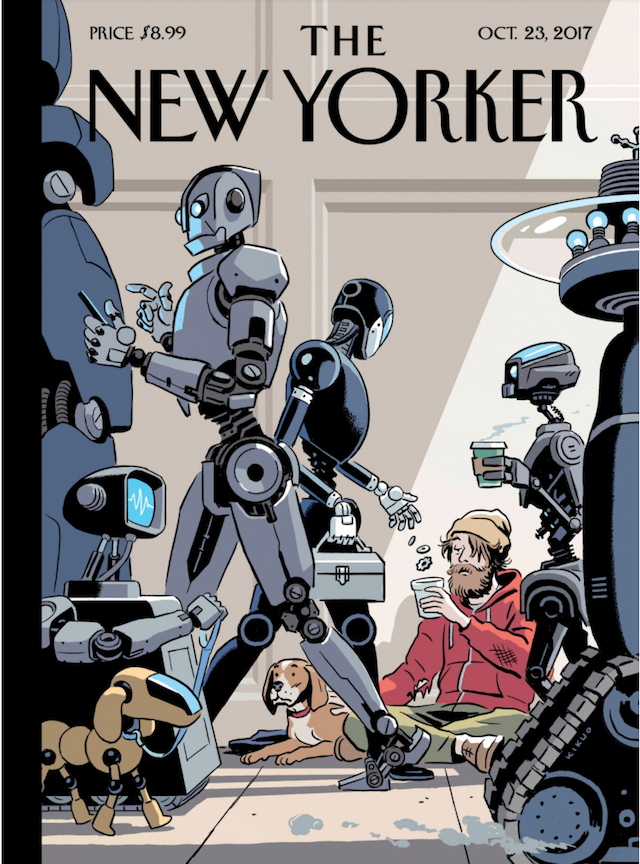 New Yorker cover by R Kikuo Johnson
New Yorker cover by R Kikuo Johnson
A dark time for me, finding myself absurdly triggered by completely ordinary events, and aware of the impossibility of letting go of my anxious, fear-driven, hypersensitive, reactive, stress-riddled self. Meanwhile, day to day events in the echelons of power get more and more surreal and alarming, and I can’t quite get myself to turn off the non-local ‘news’ completely; for no good reason, I just have to ‘know’. To know this is my biologically and culturally entrained self just doing the only thing it can do brings me no comfort. Not depressed about all of this; just drowning in the cognitive dissonance.
Feeling like a canary in the mineshaft, and something does not smell right.
PREPARING FOR CIVILIZATION’S COLLAPSE
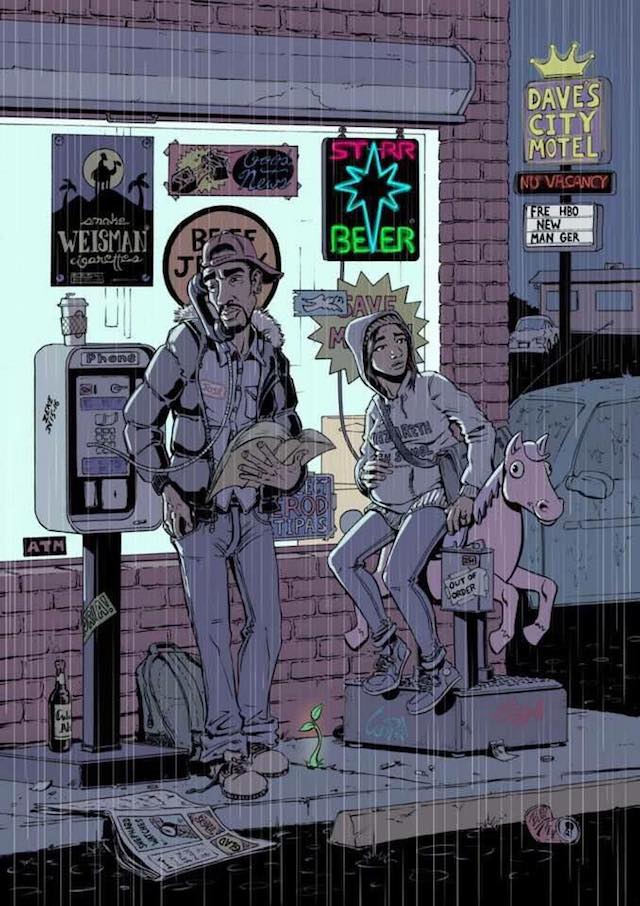
Christmas card “José y Maria” by cartoonist Everett Patterson. Thanks to Dave Bonta for the link.
When There Is No Insurance Any More: The latest from td0s describes our investment in ‘stuff’ and what happens when we can no longer insure it against loss, because the risk of loss is now too great: “Is there a greater fear than being reset to zero after years and years of numb drudgery, all of it in the service of stacking up a bigger and bigger pile of things? The entire edifice of consumer society rests on the idea that we will work today and that the things we buy will still be ours tomorrow. No longer able to live in the world, to see the providence in the fields and streams, only the store shelves can keep us alive, and so we tithe the gods of chance praying that the future is long and uneventful.”
Listen for the Howl: If you didn’t read my short story that referenced td0s’ remarkable post Boldly Through the Darkness, take a moment to read it.
LIVING BETTER
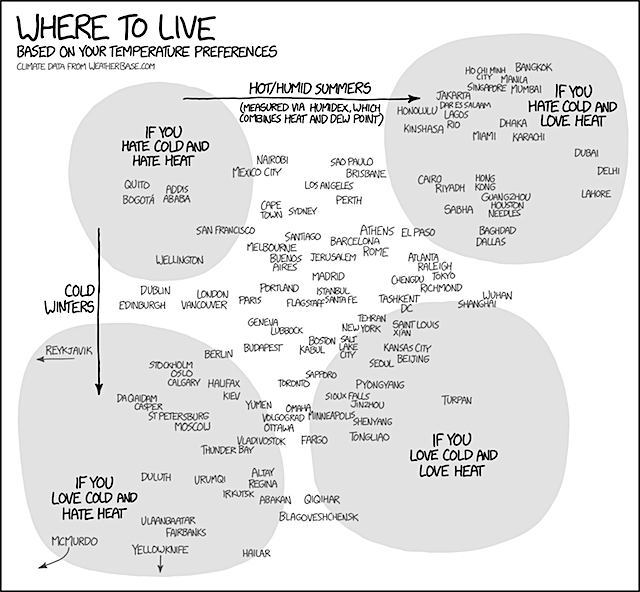
Where you should live depending on your temperature preferences, from the inimitable xkcd. Before you move, you might want to consider how your new home will be affected by climate change
There Is No Jim Carrey: Thanks to his friend Jeff Foster, Jim embraces radical non-duality. And scientists continue to come up with findings that support this message; most recently comes the finding that the universe shouldn’t exist, and a biology book that asserts you have no free will.
Census Maps: Since a picture is often worth a thousand words, Census Mapper now allows Canadians to get a visual representation of census data by census division. The app breaks data down into deciles so you can see how your neighbourhood stacks up with others in income, home ownership, costs of living, demographics and other data. Thanks to Jens and Alejandro for developing it!
Best Science Books of 2017: The always-excellent BrainPickings (Maria Popova’s labour of love) lists her favourite new science books of the year; a tremendous list. Thanks to Tree Bressen for the link.
POLITICS & ECONOMICS AS USUAL
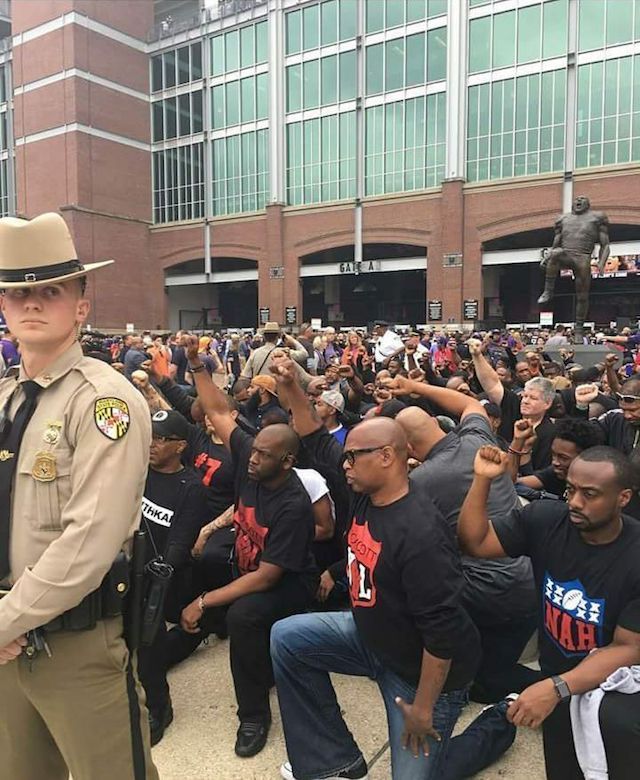
Taking a Knee at a Ravens Game — from Facebook, original source unknown
Enough is Enough: Satirist “Jonathan Pie” comments on the latest absurdities of 45. And here’s a very revealing interview with the man behind the satire.
Canada’s Doing Just Fine, Thanks: A writer humorously tells the US Ambassador to Canada that Canadians don’t need or want any help to be “as successful as Americans”.
Blaming the Victims: Millions of people turn to drugs or alcohol when there is no other way they can find to cope with their suffering. The cost of this is multifaceted: the health costs (money and misery) of and to the users, the misery they (mostly unintentionally) inflict on others as a consequence of their actions and inactions, the crimes some commit to pay for the drugs, and the massive cost of the absurd “war on drugs”. It is so easy to proffer simple solutions: mostly ban the drugs (this has never worked and actually increases the cost), and blame the victims. Thousands of people are now dying each year of fentanyl poisoning — toxins put into street drugs by uncaring dealers and pushers to reduce their cost and to increase the dose (to encourage ‘repeat customers’). Meanwhile millions of people suffering from chronic pain, who have been prescribed opiates for years for pain conditions that never let up and for which there is no known medical cure or effective alternative treatments, are now demonized and presumed to be addicts at a high risk for ‘abuse’, and deprived of essential pain relief under harsh hew prescribing rules in the latest blame-the-victim chapter of the endless “war on drugs”. What are they to do? If they can no longer get their prescriptions filled safely by their doctors (many of whom are being threatened by medical associations, insurers and political agencies to reduce opioid prescribing across-the-board), they are forced to turn to the streets, swelling the numbers exposed to fentanyl poisoning. Vicious cycle. We never learn.
FUN & INSPIRATION
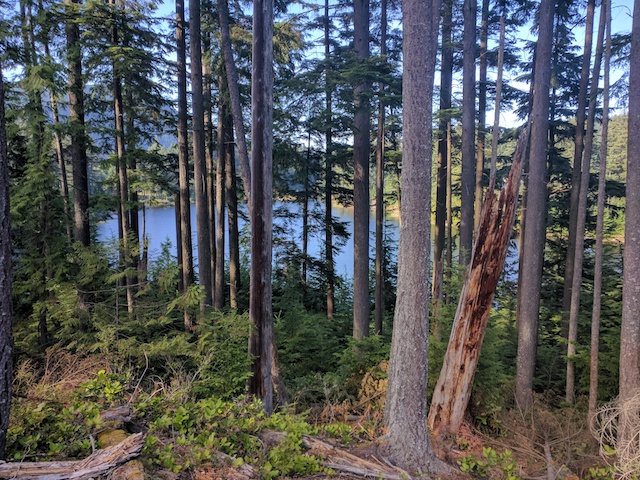
Josephine Lake, Bowen Island (my own photo)
Hawk Raised By Eagles: The story of the tiny red-tailed hawk on Vancouver Island that muscled itself into a young eagle family in their nest, and ended up being raised as if it were an eagle.
Iconic Tree Replaced on Building Top: A condo in English Bay (Vancouver BC) has long been the home to a famous rooftop pine tree that the builder/owner insisted be there to recognize the average height (60m) of the temperate rainforest that had been felled to construct the English Bay community. When the tree died, it took two years to find a suitable replacement, and half a million dollars to get it up into place on the roof. Out on her balcony, Kelly Gavin snapped the shot at sunset just as it was being lowered into place, that the CBC used at the top of its coverage. Now waiting to see if the bald eagles return to nest there.
Fox and the Whale: Quirky, unsentimental animation from Robin Joseph.
Faster Growth Means Fewer Nutrients: Ironically, as the increased amount of CO2 in our atmosphere allows plants (which need it to live) to grow faster, they are producing food with fewer nutrients (less time for them to mature and metabolize). That means the food we eat is poorer too. Thanks to Tree Bressen for the link.
I Want My Bonus Years: The writer urges men to start dating women their own age, for everyone’s benefit. (NB: This is a NYT article, so if you’ve used up your “10 articles per month quota” you won’t be able to read it, or re-read it.)
The Case for Not Being Born: Philosopher David Benatar argues that life and death both entail enormous amounts of suffering, so it is better not to be born (or have children) in the first place.
Trump’s Slurred Speech Tied to Low Battery in Putin’s Remote: Humour from Andy Borowitz on 45’s recent addled speech patterns.
Giving Up Butter: The 5 Stages of Grief: A hilarious take on the naming of butter substitutes. Thanks to Ben Collver for the link.
THOUGHTS OF THE QUARTER
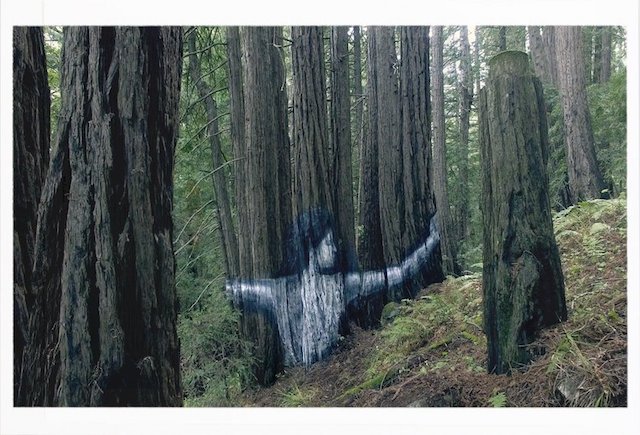
Land art, Pūliki (“the embrace” in Hawai’ian), created using non-toxic biodegrading chalk, across a whole series of trees, by Hula (Sean Yaro). Also check out his ‘Ōwena.
From Rachel Carson: “If you write what you yourself sincerely think and feel and are interested in, the chances are very high that you will interest other people as well.” (thanks to BrainPickings for this quote and the two that follow)
From Seneca: “There are more things … likely to frighten us than there are to crush us; we suffer more often in imagination than in reality.”
From James Baldwin: “You have to go the way your blood beats. If you don’t live the only life you have, you won’t live some other life, you won’t live any life at all. That’s the only advice you can give anybody. And it’s not advice, it’s an observation.”
From Dave Snowden (thanks to Chris Corrigan for the link) on coping with complexity:
- DO: Change the granularity (drill down or get up above the detail); Distributed cognition (get others to help you make sense of it); Disintermediated sensemaking (don’t rely on media/experts/leaders to make sense of things for you).
- AVOID: Premature convergence (keep an open mind on what it all means); Retrospective coherence (rationalizing in hindsight); Pattern entrainment (getting into oversimplification and other bad sense-making habits learned from others).
- ASK: What can I change? What can I monitor? What can I dampen and amplify? (provided you aren’t a non-dualist).





Pingback: Links of the Quarter — December 2017 | Leap Daily
Dave
Just a couple of thoughts for you to ponder in the dark days of winter:
First, the connection between increased CO2 and the decline in nutrient density of food:
https://media.csuchico.edu/media/Soil+MicrobesA+Their+Powerful+Influence+in+Agroecosytems/0_ltz0ea1h
https://vimeo.com/149989170
Christine Jones in the second video talks about the destruction of the soil microbial community through ‘modern’ agricultural methods and the resulting dysfunction in the assemblage of nutrients into the plants. David Johnson in the first video shows that plants have the ability to apportion the use of carbon to where it is most appropriate given the circumstances. For example, when a plant is starved it will put most of its photosynthetically produced carbon into root exudates to feed the microbes which provide it with usable minerals and nitrogen and water. As the plant gets better nourished, it changes where it puts the carbon.
Models which fail to take into account the ‘intelligence’ of the plants are likely to miss the point. It is also true, as Christine Jones says, that modern seed selection picks seeds which omit the symbiotic mechanisms honed by hundreds of millions of years of evolution in favor of modern creations which are entirely dependent on a flood os synthetic nitrogen, mined phosphorus, and various soil amendments, all of which are utterly dependent on a fossil fueled economy.
The talk by Johnson applies the evidence from his experiments in New Mexico to project that more than all of the fossil fuel emissions could be sequestered if we return to an evolution based agriculture using the microbial, and particularly, fungal systems on which life depends.
Second, in terms of Robert Sapolsky and the issue of free will. Let me quote the jacket blurb that Sapolsky wrote for Lisa Barrett’s book How Emotions Are Made:
”We all harbor an intuition about emotions: that the way we experience joy, fear, or anger happens automatically and is pretty much the same in a Kalahari hunter-gatherer. In this excellent new book, Lisa Barrett draws on contemporary research to offer a radically different picture: that the experience of emotion is highly individualized, neurobiologically idiosyncratic, and inseparable from cognition. This is a provocative, accessible, important book.’
Now a quote from Barrett, page 174:
‘If your brain operates by prediction and construction and rewires itself through experience, then it’s no overstatement to say that if you change your current experiences today, you can change who you become tomorrow.’
The nihilist position you seem to be adopting says:
There is no ‘you’ which could possibly ‘decide’.
Changing experiences (e.g., by changing environment) is not an option that ‘you’ have the freedom to choose.
You seem to be quite dug in to your nihilism, but I suggest it is not a healthy place to be.
If I come across as one who is quite confident of my position, let me assure you that it’s not true. I have only suggestions. Consider, for example, Lisa Barrett’s concept of ‘core systems’. Barrett argues against the notion that our emotions are centered in particular brain segments, such as the amygdala. In my experience, Sapolsky has been using the notion of brain localization for quite some time, so I believe Barrett differs from him. Whether Sapolsky will reconsider, or whether I don’t understand them, I leave to your discretion.
But suppose that Barrett is correct that we have a number of core systems, one of which is a concern for status. Now let’s assume that some scientist puts some undergraduates in a room and tests them on pictures of black faces and white faces and shows that, within milliseconds, the students can identify and put into a category the black faces vs. the white faces. And so we see newspaper articles showing that ‘racism is inborn’. Yet another scientist shows some undergraduates a picture of the Duke basketball team and a picture of the North Carolina basketball team. Both teams have both white and black members. Yet the students will almost instantaneously pick out the ‘good guys’ vs. ‘the bad guys’. So….the context is everything.
If you are of a mind that sorting people into bins which relate to your own status using skin color or basketball teams is stupid, then you MIGHT be able to adopt some other standard. You might, for example, sort people into those who are trying to eat food which is produced in ways which save the planet and nourish humans vs. those who eat junk food. So, while it may be true that we cannot simply turn off the status switch, we can select socially redemptive cognitive concepts. Our ability to change the controlling concepts is not independent of the environment we choose to live in.
Don Stewart
Give me Nihilism, non-duality, godless mysticism, god as being, non human thinking whatever you want to call it but science explains nothing. We are saturated with myth and this effort of Dave over many years has opened my eyes. Personally I have my own struggles “controlling” the relationship with myself. If you have mastered your feelings and thinking together then please keep sharing your secrets with the rest of us. Self awareness should not be taken for granted for being our / humans defining feature.